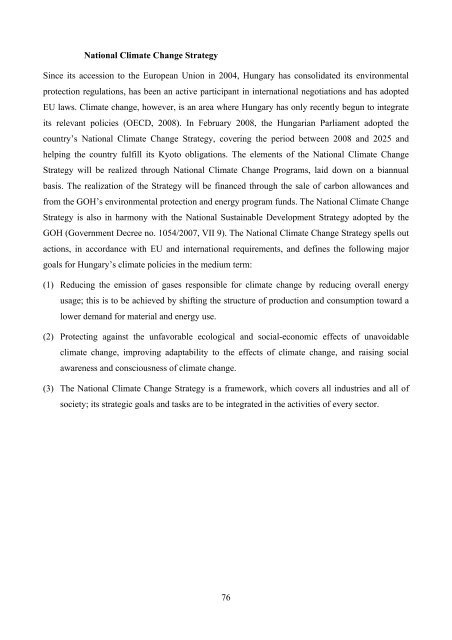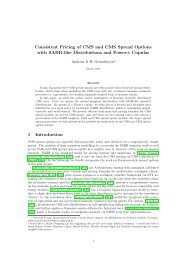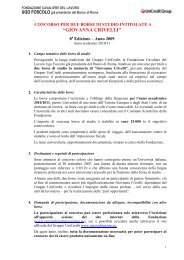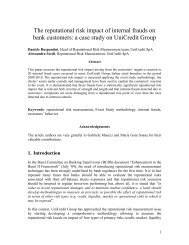Dóra Fazekas Carbon Market Implications for new EU - UniCredit ...
Dóra Fazekas Carbon Market Implications for new EU - UniCredit ...
Dóra Fazekas Carbon Market Implications for new EU - UniCredit ...
Create successful ePaper yourself
Turn your PDF publications into a flip-book with our unique Google optimized e-Paper software.
National Climate Change Strategy<br />
Since its accession to the European Union in 2004, Hungary has consolidated its environmental<br />
protection regulations, has been an active participant in international negotiations and has adopted<br />
<strong>EU</strong> laws. Climate change, however, is an area where Hungary has only recently begun to integrate<br />
its relevant policies (OECD, 2008). In February 2008, the Hungarian Parliament adopted the<br />
country’s National Climate Change Strategy, covering the period between 2008 and 2025 and<br />
helping the country fulfill its Kyoto obligations. The elements of the National Climate Change<br />
Strategy will be realized through National Climate Change Programs, laid down on a biannual<br />
basis. The realization of the Strategy will be financed through the sale of carbon allowances and<br />
from the GOH’s environmental protection and energy program funds. The National Climate Change<br />
Strategy is also in harmony with the National Sustainable Development Strategy adopted by the<br />
GOH (Government Decree no. 1054/2007, VII 9). The National Climate Change Strategy spells out<br />
actions, in accordance with <strong>EU</strong> and international requirements, and defines the following major<br />
goals <strong>for</strong> Hungary’s climate policies in the medium term:<br />
(1) Reducing the emission of gases responsible <strong>for</strong> climate change by reducing overall energy<br />
usage; this is to be achieved by shifting the structure of production and consumption toward a<br />
lower demand <strong>for</strong> material and energy use.<br />
(2) Protecting against the unfavorable ecological and social-economic effects of unavoidable<br />
climate change, improving adaptability to the effects of climate change, and raising social<br />
awareness and consciousness of climate change.<br />
(3) The National Climate Change Strategy is a framework, which covers all industries and all of<br />
society; its strategic goals and tasks are to be integrated in the activities of every sector.<br />
76









